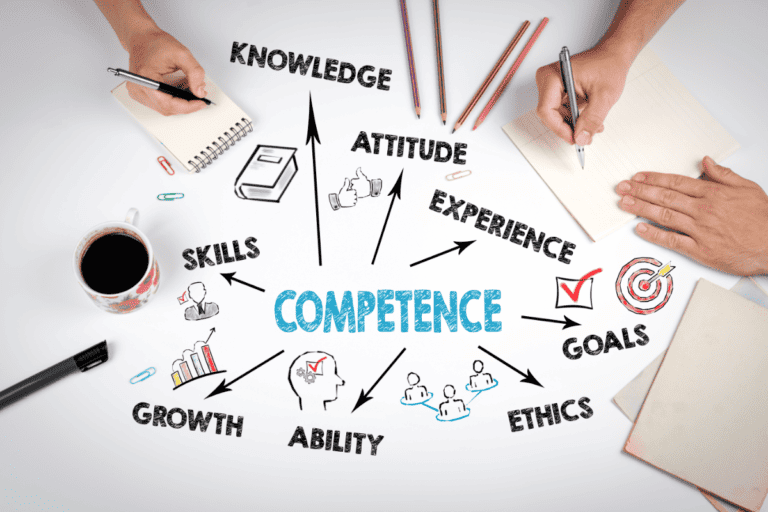Winning Strategies for Remote Job Interviews
Remote job interviews have become increasingly common, making it important to know how to effectively navigate the virtual interview process. In this article, we will provide you with winning strategies and tips to help you excel in remote job interviews. These strategies include practicing with the interview technology, presenting yourself well through attire and background, conducting thorough company research, building rapport with your interviewer, preparing thoughtful questions, and taking notes during the interview.
Key Takeaways:
- Practice using the interview technology before the remote job interview.
- Present yourself professionally through attire and background.
- Conduct thorough research on the company and industry.
- Build rapport with your interviewer by actively engaging in the conversation.
- Prepare thoughtful questions and take notes during the interview.
Practice with the Interview Technology
One key aspect of remote job interviews is being comfortable with the technology used during the interview. Prior to the interview, familiarize yourself with the video conferencing platforms such as Zoom, Whereby, Teams, or Google Meet that the interviewer may use. Conduct a test run to ensure that your camera and microphone are working properly and that you can successfully join a meeting. Additionally, practice using any other tools or software that may be required during the interview, such as whiteboarding tools or presentation sharing capabilities.
Test Your Equipment and Connectivity
Before your remote job interview, it’s crucial to test your equipment and internet connection to minimize any technical issues. Here are a few steps you can take:
- Check your camera and microphone: Ensure that your camera is functioning correctly and positioned at eye level. Test your microphone by recording a short audio clip and playing it back to ensure clear sound quality.
- Test your internet speed: Use an online speed test tool to check your internet connection’s speed and stability. A reliable internet connection is essential for a smooth remote interview experience.
- Join a mock meeting: Use the video conferencing platform that will be used for the interview to join a mock meeting with a friend or family member. Practice sharing your screen, using the chat function, and adjusting your audio and video settings.
By testing your equipment and connectivity in advance, you can identify and resolve any potential issues, allowing for a seamless interview experience.
Familiarize Yourself with Remote Interview Tools
In addition to video conferencing platforms, remote job interviews may involve the use of other tools or software. It’s essential to familiarize yourself with these tools to ensure confidence and competence during the interview. Here are some common remote interview tools:
- Whiteboarding tools: Some interviews may require you to solve problems or explain concepts using a virtual whiteboard. Practice using whiteboarding tools to become comfortable with their features and functionality.
- Presentation sharing capabilities: If you’re asked to deliver a presentation during the interview, ensure that you understand how to share your screen and navigate through the slides smoothly. Familiarize yourself with the presentation software that will be used.
- Collaboration platforms: Companies often use collaboration platforms like Google Workspace or Microsoft Office 365 for document sharing and real-time collaboration. If you’re asked to collaborate on a document or participate in a shared workspace, spend time exploring and practicing with these tools.
Example Table ExampleTable 1: Popular Video Conferencing Platforms
| Platform | Features |
|---|---|
| Zoom | High-quality video and audio, screen sharing, virtual backgrounds, chat functionality |
| Whereby | Browser-based, easy-to-use interface, screen sharing, customizable rooms |
| Microsoft Teams | Integration with Microsoft Office 365, video and audio calls, screen sharing, chat and collaboration features |
| Google Meet | Integration with Google Workspace, high-quality video and audio, screen sharing, chat functionality |
By practicing with the interview technology and familiarizing yourself with the tools and platforms involved, you can confidently navigate the remote job interview process and increase your chances of success.
Present Yourself Well through Attire and Background
When it comes to remote job interviews, maintaining a professional appearance and setting is just as important as it would be for an in-person interview. Even though the interview is conducted virtually, the way you present yourself through your attire and background can leave a lasting impression on the interviewer.
- Choose appropriate attire: Dressing professionally for a remote interview demonstrates your respect for the opportunity and your commitment to the job. Wear clothing that aligns with the role and company culture, projecting a polished and put-together image. Remember, even though you may be at home, wearing sweatpants and a t-shirt is not recommended for a remote job interview.
- Create a clutter-free background: Take a moment to evaluate your interview space. Ensure that your background is clean, organized, and free of distractions. Remove any personal items or clutter that may capture the interviewer’s attention and detract from the conversation. A simple and neutral background will help maintain focus on you and your qualifications.
- Optimize lighting: Adequate lighting is crucial for a remote job interview. Make sure you are well-lit, avoiding overly dim or harsh lighting conditions. Natural light is ideal, so consider positioning yourself near a window. If natural light is not available, use artificial lighting to create a soft and flattering glow.
If your current surroundings are not suitable for a professional interview setting, you may consider using an artificial background. Many video conferencing platforms offer virtual backgrounds that allow you to choose a professional image or blur your existing background. Ensure that the chosen background is appropriate and does not distract from the conversation.
In summary, paying attention to your attire and background during a remote job interview can help you make a positive impression. Dress professionally, create a clean and clutter-free background with good lighting, and consider utilizing virtual backgrounds if needed. Remember, presenting yourself well shows your dedication and professionalism, increasing your chances of interview success.
| Remote Interview Attire and Background Tips | Best Practices |
|---|---|
| Dress professionally | Choose attire that matches the role and company culture |
| Create a clutter-free background | Remove distractions and ensure a clean and organized environment |
| Optimize lighting | Ensure adequate, flattering lighting for a professional appearance |
| Consider virtual backgrounds | Use virtual backgrounds if your current surroundings aren’t suitable |
Conduct Thorough Company Research
Prior to the remote job interview, investing time in conducting comprehensive research on the company is essential for remote interview preparation, remote interview skills, and remote job interview success. By gaining a deep understanding of the company’s values, mission, and vision, as well as exploring their website and careers page, you can align your answers and questions with the company’s goals.
Immerse yourself in the company’s culture, exploring their handbook if available, to gain valuable insights into their work environment and values. By immersing yourself in the company’s culture, you can prepare thoughtful responses that demonstrate your dedication and understanding during the interview.
In addition to understanding the company itself, it’s crucial to research the competitive landscape of the industry. Stay up-to-date on recent industry developments and funding rounds related to the company, as this knowledge showcases your proactive mindset and positions you as a well-informed candidate. This knowledge can be used to ask insightful questions and engage in meaningful conversations during the interview.
Taking the time to conduct thorough company research before the interview not only helps you provide relevant and tailored responses, but it also showcases your genuine interest and dedication to the role and the organization as a whole. By demonstrating your knowledge and understanding, you increase your chances of remote job interview success.
Benefits of Conducting Company Research
| Benefits | Explanation |
|---|---|
| Alignment | Align your answers with the company’s goals and values. |
| Evidence of preparation | Showcase your dedication and understanding of the company. |
| Credibility | Appear well-informed and knowledgeable about the industry. |
| Engagement | Ask insightful questions and engage in meaningful conversations. |
Build Rapport with Your Interviewer
Building a connection with your interviewer, even in a remote setting, is essential. It not only helps create a positive impression but also sets the foundation for a productive and engaging interview experience. Here are some tips to guide you:
- 1. Maintain a friendly and open attitude: Show genuine interest and enthusiasm throughout the interview. A warm and approachable demeanor can help establish a positive rapport with your interviewer.
- 2. Actively listen and engage: Pay close attention to the interviewer’s questions and remarks. By actively listening, you can respond thoughtfully and demonstrate your preparedness for the remote job interview.
- 3. Ask thoughtful questions: Engage in the conversation by asking insightful questions that showcase your interest in the role and the company. This demonstrates your eagerness to learn more and your dedication to the position.
- 4. Seek clarification when needed: If something is unclear or if you need further information, don’t hesitate to ask for clarification. This shows your attentiveness and ensures that you fully understand the context of the questions being asked.
- 5. Find common ground: Look for shared interests or experiences that you can discuss during the interview. This personal connection can help create a more comfortable and engaging conversation.
Remember, building rapport is about establishing a connection based on mutual respect and understanding. By showing genuine interest, actively engaging in the conversation, and asking thoughtful questions, you can build a positive rapport with your interviewer and leave a lasting impression.
Now, let’s take a look at a sample table that highlights the key strategies for building rapport during remote job interviews:
| Strategies for Building Rapport | |
|---|---|
| Maintain a friendly and open attitude | Being approachable and displaying a positive demeanor |
| Actively listen and engage | Paying attention and responding thoughtfully to questions |
| Ask thoughtful questions | Showing curiosity and interest in the role and company |
| Seek clarification when needed | Ensuring a clear understanding of the interviewer’s expectations |
| Find common ground | Establishing a personal connection through shared interests |
Prepare Thoughtful Questions and Take Notes
During a remote job interview, it’s essential to come prepared with a list of thoughtful and insightful questions. These questions will not only demonstrate your interest in the role and company but also showcase your understanding of the industry.
As you engage in conversation with the interviewer, make sure to actively listen and take notes. Jotting down important points and key takeaways shows your attentiveness and helps you remember crucial details for future reference.
Avoid relying too heavily on a cheat sheet during the interview. Instead, focus on engaging in a natural and meaningful conversation, using your notes as a reference to guide your questions and responses.
By preparing thoughtful questions and taking notes, you can showcase your enthusiasm, professionalism, and dedication to the remote job interview process.
Example Questions to Ask During a Remote Job Interview:
Here are some example questions you can consider asking during a remote job interview:
- Can you tell me more about the company culture and team dynamics?
- What qualities and skills are you looking for in the ideal candidate?
- How would you describe the typical career path for someone in this role?
- What are the biggest challenges or opportunities currently facing the company?
- How do you support remote employees and ensure effective collaboration?
- What are the next steps in the hiring process after this interview?
Remember, these questions should be tailored to the specific role and company you are interviewing with. Use them as a starting point and customize them based on your research and the information shared during the interview.
Show Up on Time and Be Prepared
Punctuality is a crucial aspect of remote job interviews. Being prepared and joining the interview on time sets a positive impression and reflects your professionalism. Here are some essential tips to ensure you are ready for your remote interview:
- Test your equipment: It’s important to test your video conferencing equipment, such as your camera and microphone, before the interview. Make sure they are in proper working condition to ensure smooth communication during the interview.
- Check your internet connection: Ensure that you have a stable internet connection to avoid any technical glitches during the interview. Consider using a wired connection for a more reliable connection.
- Dress professionally: Even though the interview is remote, dressing professionally will help you get into the right mindset. Dress according to the company’s dress code or in business attire to make a positive impression.
- Have necessary documents handy: Print out a copy of your resume and any other relevant documents and have them readily available during the interview. This will help you reference important information or provide examples when needed.
- Prepare a quiet and distraction-free environment: Find a quiet and private space for your interview. Minimize background noise and distractions to ensure that you can focus on the conversation with the interviewer.
- Keep pen and paper ready: Have a pen and paper within reach to take notes during the interview. This will help you jot down important points or questions that you want to address later.
By following these remote interview etiquette and preparation tips, you can show your professionalism, engage effectively with the interviewer, and increase your chances of remote job interview success.
Make Eye Contact with the Camera
During video interviews, it is crucial to maintain eye contact with the camera instead of looking at your own image on the screen. This simple technique creates a sense of connection with the interviewer and demonstrates your engagement and focus. By looking directly into the camera, you show that you are actively participating in the conversation and paying attention to the interviewer’s words.
To help you remember to maintain eye contact throughout the interview, you can consider using visual reminders such as a sticky note or even placing googly eyes near the camera. These can serve as subtle cues to keep your gaze directed towards the camera and ensure that you establish a strong connection with the interviewer.
Remember, making eye contact during a remote interview is essential in showcasing your professionalism and attentiveness. It helps create a positive impression and conveys your genuine interest in the opportunity.
Key Points:
- Maintain eye contact by looking directly into the camera during the video interview.
- Focus on creating a sense of connection and engagement with the interviewer.
- Consider using visual reminders like sticky notes or googly eyes near the camera.
- Making eye contact shows your professionalism and genuine interest in the opportunity.
Stay Focused and Visibly Engaged
Demonstrate your active listening skills during the remote interview. Nod your head to show understanding, ask clarifying questions, and take handwritten notes to capture important information. This shows your engagement and attentiveness to the conversation. Avoid distractions and maintain a professional demeanor throughout the interview.
Active Listening and Non-Verbal Cues
During a remote job interview, actively listening to the interviewer is crucial for success. By nodding your head in agreement or understanding, you signal that you are engaged and paying attention. This simple non-verbal cue demonstrates your interest and helps build rapport with the interviewer.
Remember, remote interviews rely heavily on audio and visual cues. Nodding your head conveys that you are actively listening, even when the interviewer cannot see your facial expressions.
In addition to nodding, it’s important to ask clarifying questions when needed. This shows that you are actively processing the information and seeking further understanding. It also allows you to demonstrate your critical thinking skills and ability to absorb complex information.
Handwritten Notes for Effective Recall
Taking handwritten notes during a remote interview is a valuable practice for several reasons. First, it helps you capture important information, such as key points discussed or specific requirements mentioned by the interviewer. Writing down these details ensures that you have a record to refer back to after the interview.
Second, the act of physically writing can enhance memory retention. By engaging multiple senses—visual and motor skills—you create stronger neural connections, making it easier to recall the information later on. This can be especially beneficial when asked to provide examples or references during the interview process.
Lastly, reviewing your notes before future interviews or follow-up discussions allows you to refresh your memory and demonstrate your attention to detail. It shows that you took the conversation seriously and are invested in the opportunity.
Avoiding Distractions and Maintaining Professionalism
Distractions can undermine the success of a remote job interview, so it’s important to create an environment that fosters focus and professionalism. Find a quiet and well-lit space where you can conduct the interview without interruptions. Inform others in your household or workspace about the interview and request minimal disturbances during that time.
Additionally, ensure that your technology, such as your internet connection and video conferencing software, is stable and reliable. Technical issues can disrupt the flow of the interview and create unnecessary distractions.
“In a remote interview, professionalism extends beyond appearance and attire. It encompasses your level of engagement, attentiveness, and preparedness.”
By staying focused and visibly engaged throughout the interview, you convey your dedication and respect for the opportunity. It also sets a positive impression for potential employers, showcasing your remote interview etiquette and remote interview skills. Remember, a successful remote job interview demonstrates that you have the necessary remote job interview skills for success in a virtual work environment.
| Stay Focused and Visibly Engaged | Remote Interview Success |
|---|---|
| Demonstrate active listening skills | Build rapport with the interviewer |
| Ask clarifying questions to show understanding | Take handwritten notes for effective recall |
| Avoid distractions and maintain professionalism | Show commitment and remote interview etiquette |
Follow Up After the Interview
After your remote job interview, it’s important to follow up with a thank-you email or note to express your appreciation for the opportunity and to leave a positive impression. Taking the time to send a personalized message shows your professionalism, gratitude, and attention to detail. Here are some tips to help you effectively follow up:
-
Send a timely thank-you message: Within 24 hours of your interview, send a thank-you email or note to your interviewer. This demonstrates your promptness and enthusiasm for the position.
-
Express appreciation: Begin your message by expressing your gratitude for the opportunity to interview for the remote job. Thank the interviewer for their time, consideration, and the insights shared during the interview.
-
Recap key discussion points: Use the follow-up message as an opportunity to briefly summarize the key points discussed during the interview. This reinforces your understanding of the role and highlights your interest.
-
Reiterate your qualifications: Remind the interviewer of your qualifications and how they align with the requirements of the position. Highlight any relevant skills, experiences, or achievements that were discussed during the interview.
-
Show enthusiasm: Demonstrate your continued enthusiasm for the opportunity by mentioning specific aspects of the company, team, or role that excite you. This shows your genuine interest in the position and your motivation to contribute.
-
Ask about next steps: Politely inquire about the next steps in the hiring process and the timeframe for a decision. This shows your eagerness to move forward and your proactive approach to job seeking.
-
Proofread before sending: Before hitting the send button, carefully review your thank-you message for any spelling or grammatical errors. A well-written and error-free message reflects your attention to detail and professionalism.
Remember, following up after your remote job interview is an opportunity to leave a lasting impression and continue building rapport with the interviewer. It shows your commitment and interest in the position. Keep an eye on your emails for any updates or next steps regarding the job application process. Stay positive and proactive throughout the hiring process, and best of luck in your remote job interview pursuit!
Conclusion
Successfully navigating remote job interviews requires strategic preparation and a well-rounded skill set. By implementing effective strategies such as practicing with interview technology, presenting yourself professionally through attire and background, conducting thorough company research, building rapport with your interviewer, preparing thoughtful questions, and taking notes during the interview, you can significantly increase your chances of securing your desired remote job.
Remote interview preparation includes familiarizing yourself with video conferencing platforms, testing your equipment, and practicing using any necessary tools or software. Presenting yourself well through attire and background helps establish a professional image, while conducting thorough company research demonstrates your dedication and understanding of the organization.
Building rapport with your interviewer and asking thoughtful questions not only showcases your interest in the role and company, but also helps establish a personal connection. Taking notes during the interview shows your attentiveness and helps you remember key details. Remember to maintain confidence throughout the remote job interview process and highlight your skills and qualifications. Good luck!






